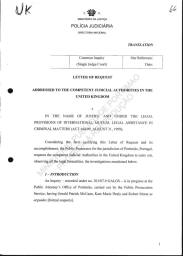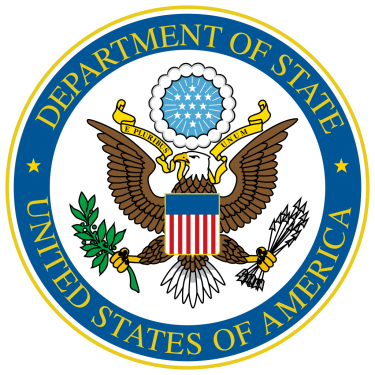The Influence of Technology on the Effectiveness of Letters Rogatory Processes
The Influence of Technology on the Effectiveness of Letters Rogatory Processes
Blog Article
Letters Rogatory Explained: Facilitating Legal Participation In Between Countries

Interpretation of Letters Rogatory
Letters rogatory are official requests made by a court in one jurisdiction to a court in an additional jurisdiction, seeking aid in acquiring proof or testimony for a legal case. This step-by-step device is crucial in the context of international legislation, where legal systems might differ, and cross-border teamwork is essential. Letters rogatory help with the event of information that may be critical for adjudicating cases, especially in circumstances involving complex multinational problems.
Usually, these demands develop in civil, criminal, or management issues where a party calls for evidence that is located outside the territory of the requesting court. The letters act as a means to make sure that the principles of due process are supported, making it possible for courts to access proof that might otherwise remain unattainable because of geographic or lawful barriers.
Making use of letters rogatory is governed by worldwide treaties, reciprocal contracts, or residential legislations, which delineate the treatments and responsibilities of the courts involved. It is very important to keep in mind that the implementation of such requests is not ensured; they depend upon the legislations and techniques of the territory getting the letter. Therefore, letters rogatory are an essential tool for cultivating lawful teamwork and making sure justice across borders.
The Process of Issuing Letters Rogatory
Issuing letters rogatory involves an organized procedure that makes certain conformity with both global and domestic legal standards. The requesting party, typically a court or legal authority, drafts a formal request detailing the nature of the aid sought, the proof or info needed, and the lawful basis for the demand. This paper should be specific to assist in understanding by the foreign jurisdiction.

The following action includes transferring the letters rogatory to the assigned international authority. This is typically done via diplomatic networks or global lawful aid frameworks, guaranteeing that the request is received and acknowledged by the international court. The foreign court then processes the demand according to its own legal procedures, ultimately reacting to the asking for party with the sought-after details or evidence, hence assisting in international legal participation.
Significance in International Legislation
The significance of letters rogatory in worldwide legislation can not be overstated, as they function as an essential mechanism for judicial participation throughout boundaries. These formal demands for aid in lawful matters permit courts in one jurisdiction to look for info, proof, or the visibility of witnesses from one more territory, consequently facilitating the management of justice in global situations.
Letters rogatory are particularly crucial in the context of globalization, where legal conflicts often span numerous countries. They allow the collection of evidence that might or else be unattainable, ensuring that legal process are educated and fair. By promoting cooperation between judicial systems, letters rogatory assistance support the regulation of legislation and advertise mutual respect among countries.
Additionally, using letters rogatory demonstrates a commitment to international standards and principles of cooperation, showing the interconnected nature of modern legal methods. It highlights the importance of adhering to established procedures and treaties, such as the Hague Convention, which supplies a structure for these requests - Letters rogatory. Ultimately, letters rogatory boost the efficacy of legal procedures, ensuring that justice is not hindered by geographical borders
Challenges and Limitations
Regardless of their relevance, letters rogatory face numerous challenges and constraints that can impede their effectiveness. One main problem is the differing lawful structures and treatments throughout territories, which can lead to misunderstandings and hold-ups in the implementation of requests. Different countries may have unique needs for the legitimacy of letters rogatory, making complex the process even more.
Additionally, the typically drawn-out nature of worldwide lawful participation can hinder timely access to evidence or witnesses. This delay may negatively affect continuous examinations or lawful process, particularly in instances needing immediate action. The lack of sources and training in more information some territories can result in inadequate handling of requests, leading to insufficient or insufficient actions.
Cultural differences and differing perspectives in the direction of lawful processes can also posture considerable barriers. As an example, countries with much less formal lawful systems might struggle to follow the step-by-step roughness expected in letters rogatory. Political tensions between nations can affect the desire to carry out demands, resulting in an absence of cooperation and reducing the utility of this device in worldwide regulation. These difficulties demand continuous dialogue and reform to improve the efficacy of letters rogatory in legal participation.
Study and Instances

Conversely, challenges can you can try this out arise, as seen in an instance involving a European country seeking proof in a continuous criminal matter from a non-EU nation - Letters rogatory. The procedure was postponed because of administrative hurdles and differing legal standards, ultimately hindering the examination
These instances illustrate that while letters rogatory can promote international participation and quicken legal procedures, they likewise highlight the need for clear communication and understanding of lawful structures between nations. Such study highlight the useful source importance of refining this tool to enhance efficiency and performance in international legal issues.
Conclusion
In summary, letters rogatory function as a vital system for facilitating legal teamwork between countries, guaranteeing the collection of evidence and statement across jurisdictions. Their importance in worldwide legislation can not be overemphasized, as they promote due process and improve the effectiveness of cross-border legal procedures. Difficulties such as varying political stress and legal frameworks might hinder their efficiency. Proceeded initiatives to improve and enhance the process are crucial for promoting stronger international judicial collaboration.
Letters rogatory are official requests made by a court in one territory to a court in an additional jurisdiction, seeking support in getting evidence or statement for a legal case. The asking for party, commonly a court or lawful authority, composes an official demand outlining the nature of the assistance looked for, the evidence or information required, and the lawful basis for the request. The international court then processes the demand according to its own lawful procedures, eventually reacting to the requesting party with the desired info or proof, thus assisting in worldwide legal teamwork.
Moreover, the use of letters rogatory shows a commitment to worldwide norms and principles of participation, reflecting the interconnected nature of contemporary lawful methods.Global legal collaboration via letters rogatory is not without its real-world implications, as illustrated by numerous instance studies that highlight both obstacles and successes.
Report this page